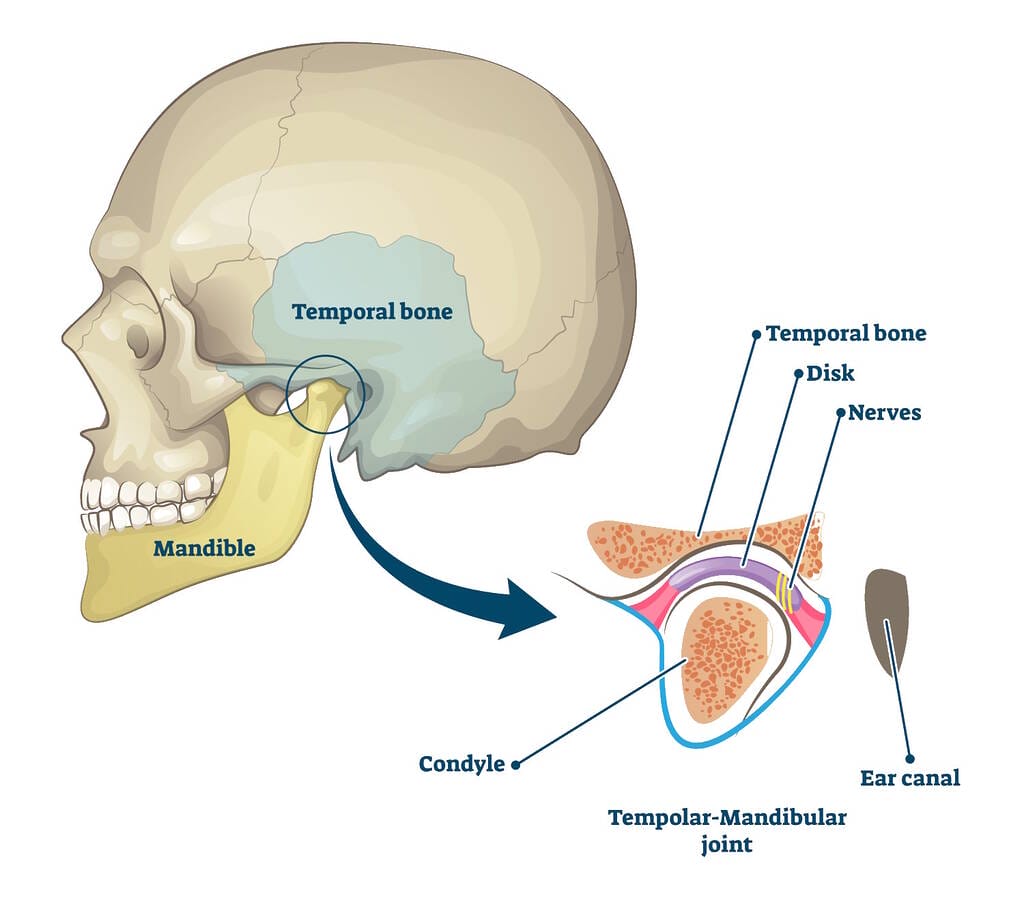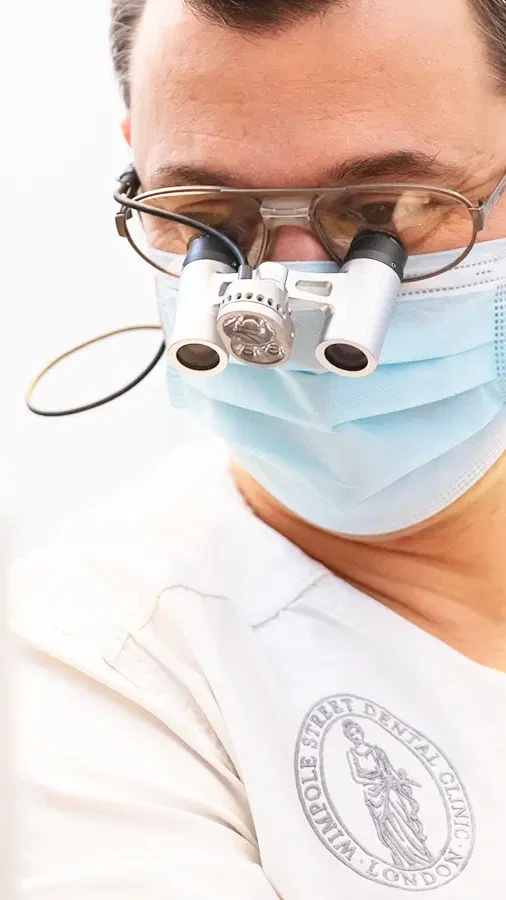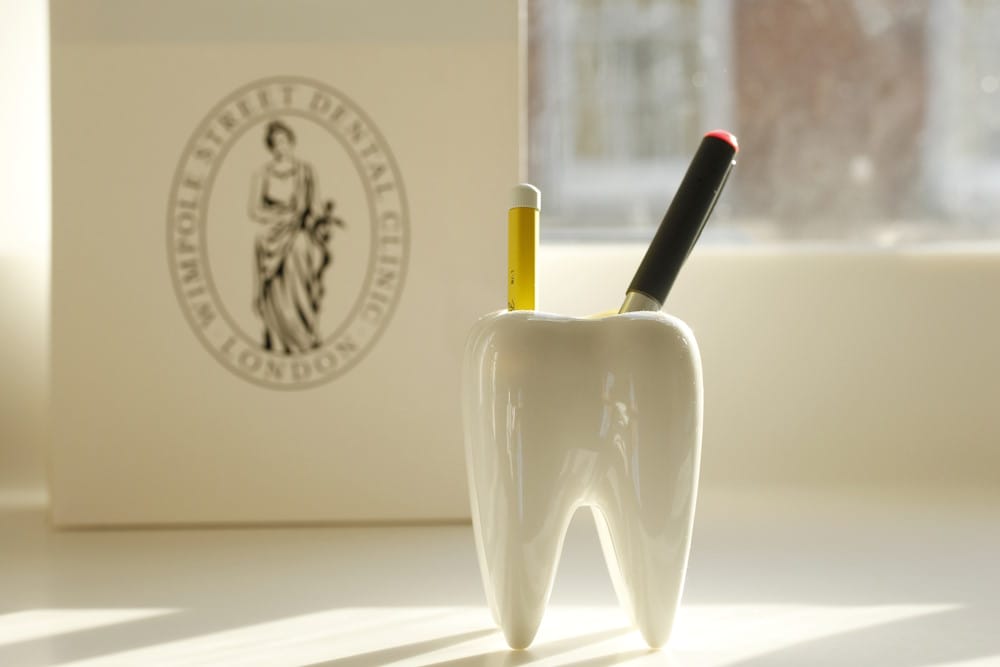TMJ Treatment London
Temporomandibular Joint (TMJ) disorder affects the jaw joint, causing pain and limited movement. Ideal for those with jaw discomfort, headaches, or chewing difficulties, our specialised TMJ treatments provide relief and improve quality of life. Choose Wimpole Street Dental Clinic for expert care, advanced diagnostics, and personalised treatment plans designed by our experienced team.

Treatment
2 weeks - 1 year

Price
From £240

Team Experience
25+ years

Recovery Time
1 week - 1 year

Google Rating
★★★★★ (4.9)

What is TMJ?
The temporomandibular joint (TMJ) is the hinge-like structure that connects your lower jaw (mandible) to the temporal bones of your skull, located just in front of each ear. This joint plays a crucial role in everyday functions such as chewing, speaking, and yawning, allowing your jaw to move smoothly up and down and side to side. When the TMJ functions properly, these movements are seamless and pain-free. However, issues with this joint can lead to a range of problems, including jaw pain, difficulty chewing, clicking or popping sounds, and even headaches or ear discomfort.
The TMJ is composed of several key components. The temporal bone, part of the skull, forms the socket of the joint. The mandible, or lower jawbone, is the moving part of the joint that fits into this socket. Between these two bones lies the articular disk, a small, flexible structure that cushions the joint and allows for smooth movement. Together, these elements form the temporomandibular joint, a complex system that, when disrupted, can cause significant discomfort and dysfunction. Understanding these components is essential to diagnosing and treating TMJ disorders effectively.

TMJ Symptoms and Causes
Meet your award-winning TMJ Treatment dentist and team…
- We have over 75+ years of combined dentistry experience across our specialist team.
- 10,000+ treatments performed and counting.
- We are leaders in the dental industry – we regularly teach, lecture and publish our research work internationally.
Step by step approach to TMJ treatment
New patient consultation and functional diagnostic
The first step in TMJ treatment is a thorough consultation to understand your symptoms and evaluate the functionality of your temporomandibular joint (TMJ). During this appointment, your healthcare professional will listen to and feel your jaw as you open and close your mouth, observe the range of motion, and gently press on areas around the joint to identify pain or discomfort.
If a problem is suspected, diagnostic tools such as dental X-rays, CT scans, or MRI imaging may be used to provide detailed insights into the structure of your jaw and surrounding tissues. In some cases, TMJ arthroscopy, a minimally invasive diagnostic procedure, may be performed to visualise the joint directly and address issues such as scar tissue or inflammation.
Bite analysis and diagnostic records
A detailed analysis of your bite is essential to understanding how your teeth align and its effect on your TMJ. Diagnostic records, including physical impressions, digital scans, or 3D models of your teeth, may be taken to provide a comprehensive view of your jaw function. These records allow for precise assessment and form the foundation for tailoring an effective treatment plan to your specific needs.
CBCT or MRI
Advanced imaging techniques, such as Cone Beam Computed Tomography (CBCT) or Magnetic Resonance Imaging (MRI), are often recommended to gain a clear view of the temporomandibular joint. These tools help in diagnosing structural abnormalities, joint degeneration, or issues with the surrounding soft tissues. With these detailed images, your healthcare provider can pinpoint the cause of your symptoms and recommend the most appropriate course of treatment.
Treatment planning
Your personalised treatment plan will be developed based on the findings from your diagnostic assessments. Treatment options can range from non-invasive approaches such as physiotherapy or nightguards to more involved solutions like orthodontics or full-mouth reconstruction. Medications may be prescribed to alleviate pain, while therapies such as jaw exercises, self-care techniques, or counseling may help improve your symptoms and address contributing habits. Surgical options, including minimally invasive procedures like arthrocentesis or more complex interventions such as open-joint surgery, are reserved for severe cases and are only recommended after careful consideration of the benefits and risks.
Execution of the plan
The treatment plan is implemented step by step, ensuring each phase is carried out with precision and tailored to your unique condition. Non-invasive measures are typically prioritised, and adjustments are made along the way to ensure optimal comfort and effectiveness.
Continued execution And Monitoring of the plan
Once adjustments are made, the plan continues with a focus on achieving long-term improvement. Each step is carefully executed and monitored to ensure the best possible outcome, building on the progress made during earlier phases of treatment.
Reevaluation
A final reevaluation is conducted to confirm the success of the treatment. This stage ensures that your goals have been met and that your jaw function and overall comfort have been fully restored.

Our Expertise
At Wimpole Street Dental Clinic, our approach to TMJ treatment is grounded in advanced training, innovative techniques, and patient-centred care. Unlike many practices in the UK that rely heavily on traditional splint therapy, we employ modern alternatives such as the Kois-deprogrammer, which offers a more comfortable and effective solution for muscle relaxation and bite adjustment. This device is worn for a week to relax the jaw muscles, allowing us to precisely adjust the bite to eliminate pre-contacts and ensure dynamic function without interference.
For patients with deep bites or insufficient restorations, we take a further step by offering temporary restorations or reshaping biting surfaces to recalibrate or lift the bite. This approach optimises jaw performance and provides a level of flexibility that splint therapy simply cannot match. If a patient finds the adjustments uncomfortable, the process can be easily reversed or modified, giving them control and confidence throughout the treatment journey.
Our expertise in this area, combined with cutting-edge methods, ensures a personalised and adaptable treatment experience. Choosing Wimpole Street Dental Clinic means opting for a solution that prioritizes your comfort, long-term function, and quality of life over one-size-fits-all approaches.
Wimpole St Dental Clinic has strict sourcing guidelines and relies on peer-reviewed studies, academic research institutions, and medical associations. We avoid using tertiary references. You can learn more about how we ensure our content is accurate and current by reading our editorial policy.
- Lobbezoo F, Ahlberg J, Glaros AG, Kato T, Koyano K, Lavigne GJ, de Leeuw R, Manfredini D, Svensson P, Winocur E. Bruxism defined and graded: an international consensus. J Oral Rehabil. 2013 Jan;40(1):2-4. doi: 10.1111/joor.12011. Epub 2012 Nov 4. PMID: 23121262.
- Klasser GD, Rei N, Lavigne GJ. Sleep bruxism etiology: the evolution of a changing paradigm. J Can Dent Assoc. 2015;81:f2. PMID: 25633110.
- Mark AM. What is bruxism? J Am Dent Assoc. 2021 Sep;152(9):788. doi: 10.1016/j.adaj.2021.06.012. PMID: 34454650.
- Manfredini D, Ahlberg J, Lobbezoo F. Bruxism definition: Past, present, and future – What should a prosthodontist know? J Prosthet Dent. 2022 Nov;128(5):905-912. doi: 10.1016/j.prosdent.2021.01.026. Epub 2021 Mar 5. PMID: 33678438.





